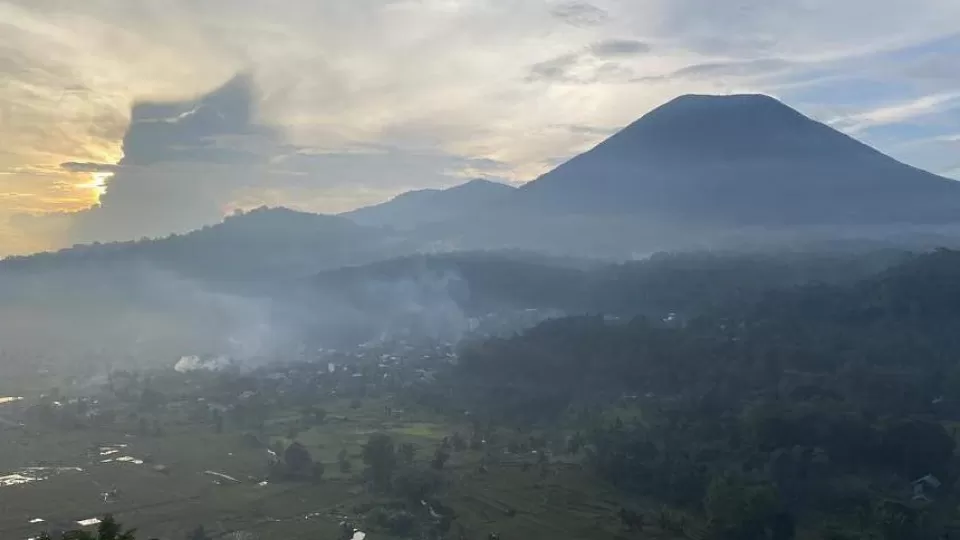September 6, 2022
SULAWESI – Standing on a rickety Indonesian fishing boat, entranced by the Milky Way stretched out above us, we are lost in deep thought when violent splashing in the waters below startles me.
“It’s a crocodile fish,” my new-found friend Darwis calls out.
We spend the next 15 minutes training our cameras on Darwis and his thrilling hunt of the “ikan buaya”, or crocodile fish.
Like all Bajaus, who take to open water as soon as they turn two years old, Darwis is an excellent freediver who needs no dive equipment other than his trusty speargun.
At this point, we have been living out of our backpacks for two weeks, clocking several days of sweltering bus, ferry and boat rides in Sulawesi.
Barely six months ago, while we were still receiving regular pay cheques, we could not have imagined embarking on this manner of travel.
In our past corporate lives – not too far from our memory – we were never very taken by the idea of travel. The regular tourist programming that involved checking off an exhaustive list of “must-sees” and setting up Insta-worthy posts only culminated in post-holiday fatigue and the ensuing need for a “vacation from a vacation”.
But this July, a month-long slow-travel journey through Sulawesi changes all that. Pandemic-weary and fresh from declaring a sabbatical, we decide to travel across rustic Sulawesi, the 11th largest island in the world.
1. An ‘extreme’ Minahasan food journey
Perched on the northern end of Sulawesi and easily accessed via a four-hour direct flight from Singapore, Manado is our gateway to the island.
The city is quick to reveal its warmth and hospitality to us. Over a Manadonese dinner at a traditional rumah makan (eating house), we befriend native Minahasans, who are eager to impart local commuting and language tips.
We have heard plenty about the Minahasans’ exotic food culture, and armed with local knowledge, set out in search of the infamous Tomohon Extreme Market, just an hour away from Manado by bus.
The market feels like any ordinary one until we turn a corner and see hanging pythons, fruit bats, skewered jungle rats, wild boars and caged dogs for sale.
Shock does not even come close to describing how we feel. The vendors we meet are incredibly generous and welcoming of us and, before long, we score ourselves an invite to join a family of villagers on their night-time hunt for bats and rats.
Our three-hour hunt is followed by another three-hour midnight cookout, where our host family processes its catch of bats and rats.
It conjures up rempah from a medley of herbs and spices, and serves up a supper of exotic meats alongside freshly steamed rice and stir-fried water spinach.
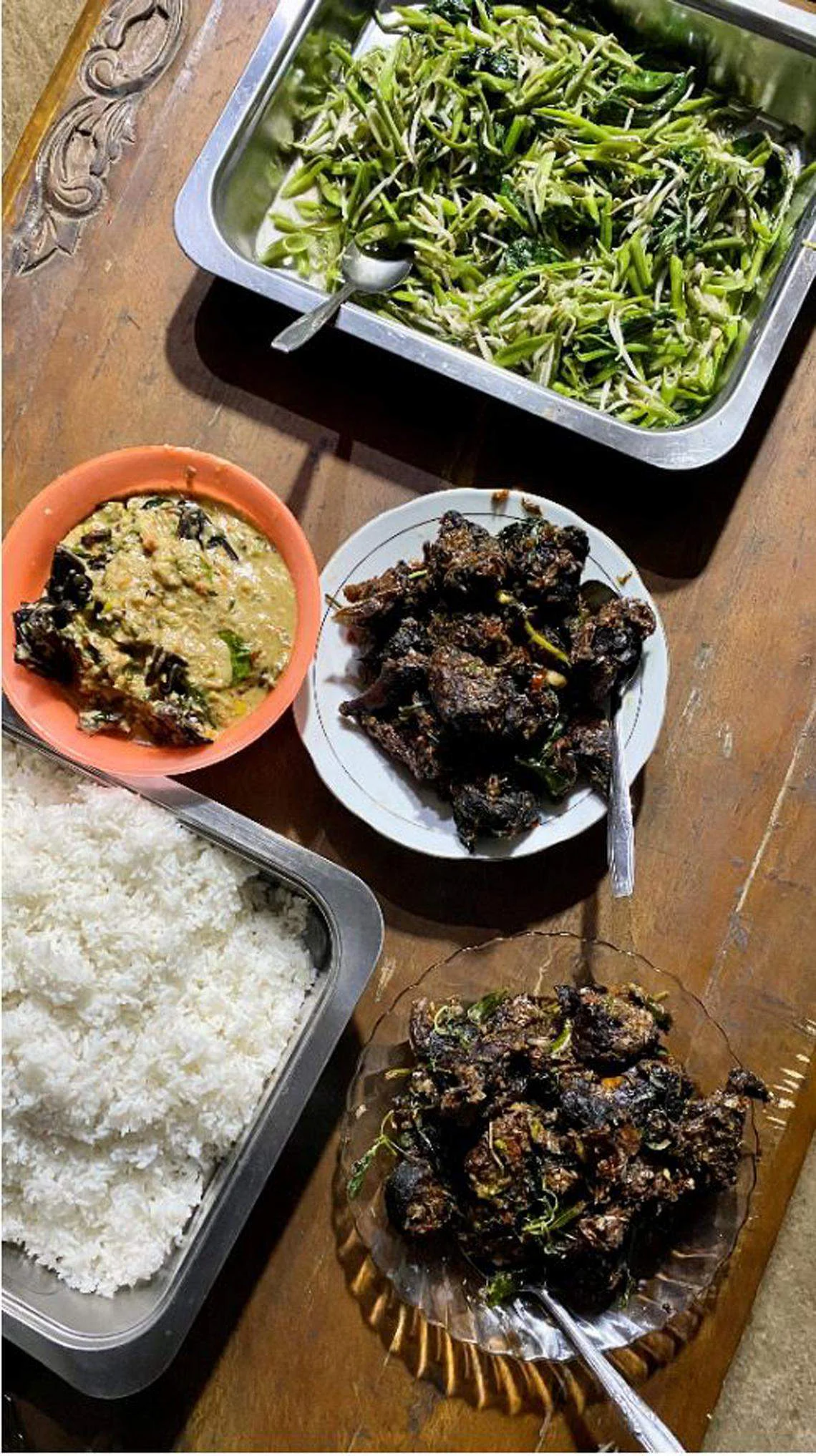
Dried coconut bat curry and rat cooked in Indonesian spices. PHOTOS: LI-ANN TAN AND JON SONG
This same generosity shadows us throughout our time in Sulawesi Utara (or North Sulawesi) and leads us to another fascinating discovery.
We learn about an orchestra that plays instruments handcrafted entirely from bamboo. They are not run-of-the-mill bamboo flutes but tubas, saxophones and trumpets, all crafted from bamboo.
After a handful of mikrolet rides (Manado’s equivalent of Bangkok’s tuk-tuks) and cups of hot tea offered by numerous villagers who spontaneously participate in our efforts to locate members of the orchestra, we finally find the master musician Trivelino Lolong in a small village called Lemoh.
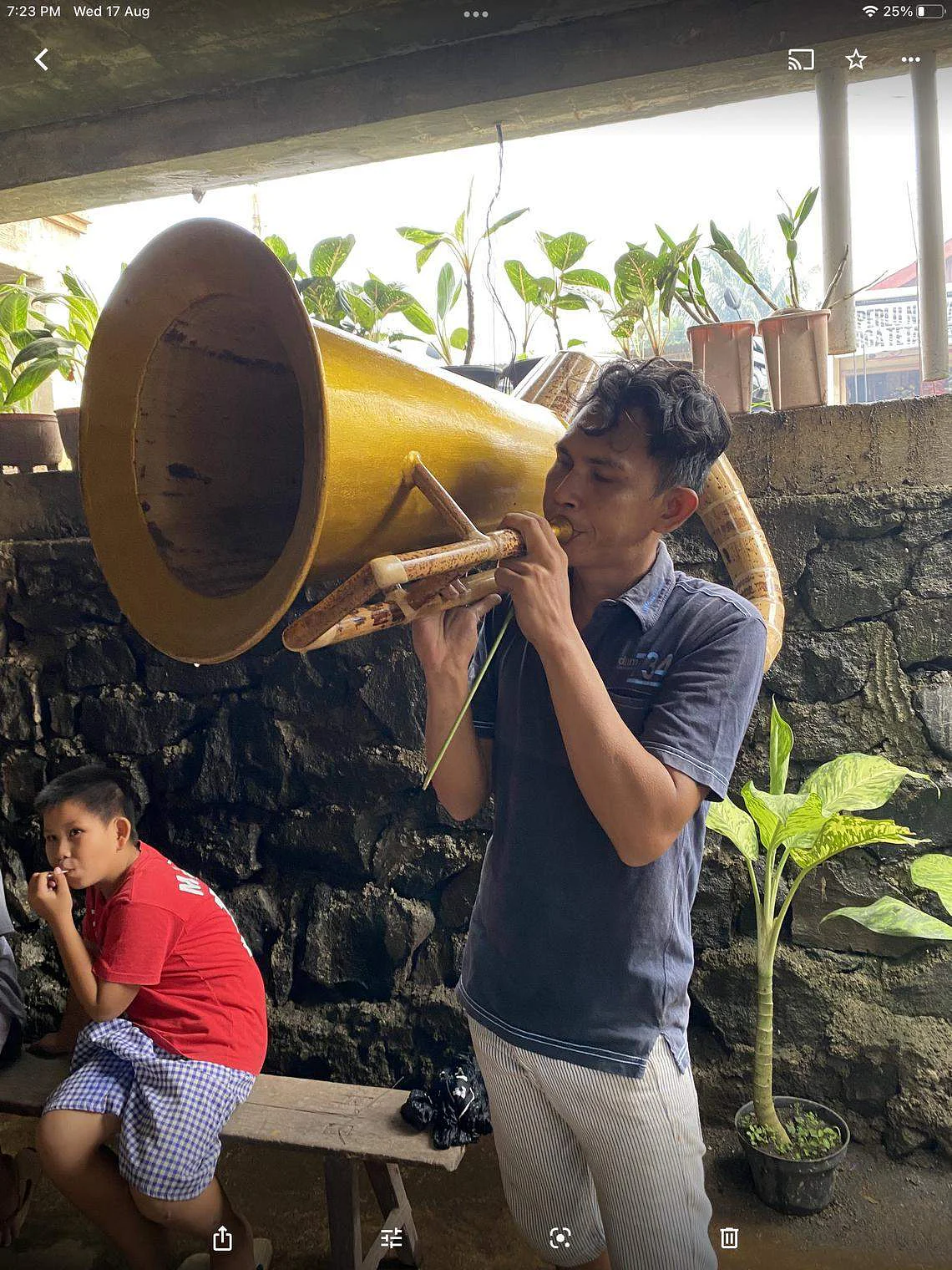
Mr Trivelino Lolong is a self-taught craftsman who makes bamboo instruments for the local schools. PHOTOS: LI-ANN TAN AND JON SONG
But Mr Lolong is more than a musician. He is also a self-taught craftsman who makes bamboo instruments for the local schools.
Surrounded by a curious group of village kids, we spend an afternoon marvelling at his handiwork, and eventually enjoy a performance by Mr Lolong and his friend on their bamboo clarinet and saxophone. While a bit rough on the edges, they really sound like they are part of a brass band.
2. Going off the grid at the Togean Islands

Due to the remoteness of the Togean islands, resorts here typically provide full-board packages. PHOTOS: LI-ANN TAN AND JON SONG
As far as remote islands go, the Togean Islands live up to their name of being low on connectivity and accessibility. It takes us a little over 36 hours on various buses, cars and boats to get to this marine paradise.
Made up of 56 smaller islands and located in the Gulf of Tomini off the Central Sulawesi coast, the archipelago is as stunning in reality as it is on social media.
There is hardly any mobile signal and no regular supply of hot water and electricity. Yet, many traverse here on their off-the-beaten-track journeys to dive in the crystal-clear waters and for Lake Mariona, the famed stingless jellyfish lake. We are here for all that but, more than anything, we come to meet the Bajau sea gypsies.
The Bajaus are nomadic people who live in the waters around Indonesia, Malaysia and the Philippines. Known for their legendary freediving skills, some of them are able to hold their breath underwater for up to 10 minutes.

Bajau women Nursia Nuntu (left) and Sarah Impa are sole breadwinners who catch octopus to support their families. PHOTOS: LI-ANN TAN AND JON SONG
Once rendered stateless by their nomadic nature, they have since been compelled by governments to move on-shore, and many now live in stilt houses by the shoreline.
On our ferry ride, a chance encounter with Mr Christopel Paino from Japesda, a conservation non-governmental organisation, leads us to Pulau Papan island where he is conducting marine conservation work at a Bajau village.

A community of Bajau sea gypsies lives on Pulau Papan, one of many islands located in the Togean archipelago. PHOTOS: LI-ANN TAN AND JON SONG
We spend several days with the Bajaus, mesmerised by their way of life, their tenacity and the coral sunsets.
On more than one occasion, we are invited to join their spearfishing trips. The way they move underwater is remarkable. We witness their freediving skills and feast on the freshest catch from the oceans prepared in the village kitchens.
For subsistence and income, the majority of Bajaus dive for seafood, specialising in catching different varieties ranging from lobsters to fish to octopus.
Most of the divers are men, but we meet two extraordinary women divers, Nursia Nuntu and Sarah Impa, who catch octopus to support their families.
We join them on one of their diving trips, and are amazed at how strong they are in the ocean, swimming several hundred metres from the fishing boat in search of octopus.
On a good day, they net between six and 10 octopus, with the larger ones fetching 65,000 rupiah (S$6.10) a kilogram. But owing to climate change and bad weather, the good days are few and far between now. They have had to take on side hustles like collecting coconuts.
3. Pondering life and death in Toraja Utara

Torajan funeral grounds are as elaborate as their ceremonies, and can take up to three months to erect. PHOTOS: LI-ANN TAN AND JON SONG
What we see in Sulawesi Utara and the Togean islands could not have prepared us for Toraja Utara, arguably Sulawesi’s most visited place.
With tourism still recovering from the debilitating effects of Covid-19, we have not encountered many fellow travellers thus far. It is different here, which is no surprise as the Toraja Utara regency is home to the Toraja ethnic group, known for its elaborate funeral rites, ancient cliff burial sites and infant burial practices.
June to October is funeral season, the main draw for tourists. Hire a local guide to take you to the funerals and festivals such as Ma’nene (or Festival Of The Dead), which happens only in August every year.
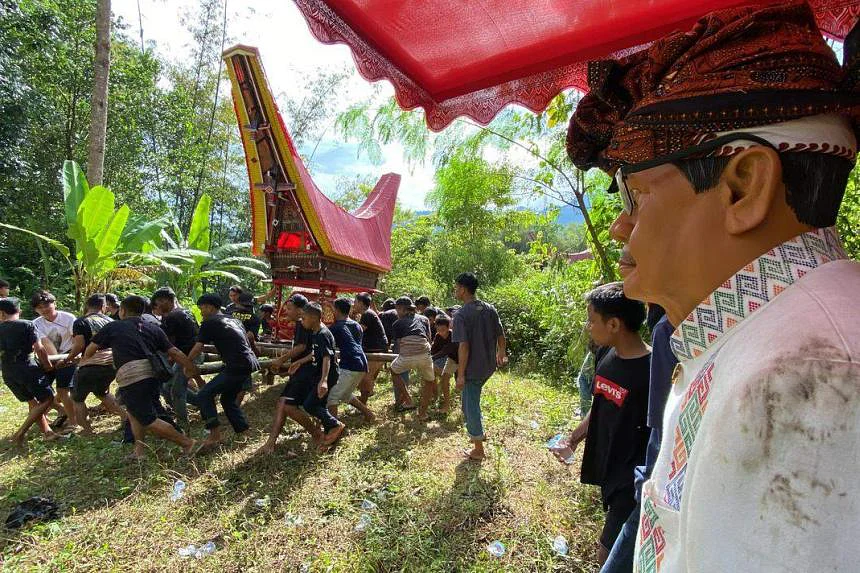
On the final day of a Torajan funeral, villagers pitch in to help the family carry the deceased’s coffin to its final resting place. PHOTOS: LI-ANN TAN AND JON SONG
We are warmly welcomed at every funeral we visit. It is incredibly strange to us, seeing that funerals are such private affairs. But in Toraja, foreigners are seen to bring prestige to the ceremonies and honour to the dead so we are treated like VIPs.
Prior to the staging of these lavish ceremonies, which can last up to a month, the bodies of the deceased are preserved and kept in their family homes for up to a few years. They are not referred to as dead but “sick”, and continue to be cared for by their relatives.
We join a family in the last stages of a funeral for its patriarch, where young lads from the village jubilantly hoist his coffin up a hilly slope towards its final resting place.

On the final day of a Torajan funeral, villagers pitch in to help the family carry the deceased’s coffin to the family tomb. PHOTOS: LI-ANN TAN AND JON SONG
Ballo (locally brewed liquor) is drunk, candy is tossed in the air and a joyous family photo is taken after the body is placed in the family tomb.
Taking caring for the departed to the next level, several villages carry out the Ma’nene ritual every year, removing the bodies of their loved ones from their buried tombs, cleaning their bodies and dressing them before placing them back into their coffins.
This practice is actually a way they show love and respect. Some even take photographs with their dead relatives.
In a place where death is so openly and widely paraded, it is surprising to find the air devoid of any grief or sorrow. In its place is a celebration of life and an appreciation for the afterlife – in this case, a journey to eternity, which the Torajans believe death is a bridge to.

With massive peaked roofs made of bamboo, these houses are said to be excellent at regulating temperature. PHOTO: LI-ANN TAN AND JON SONG
4. Post-pandemic mindful travel
Another 12-hour bus ride later, we found ourselves in Makassar city. The food here is delicious – Coto Makassar (a hearty spiced beef stew) and Konro (barbecued beef ribs) are our all-time favourites.
Unlike the earlier parts of our travel, we face no issues with Internet connectivity and have private hire drivers at our disposal. We appreciate these templated conveniences but ironically, we find the port city lacking in the bucolic energy and raw spontaneity we have become accustomed to over the past month.
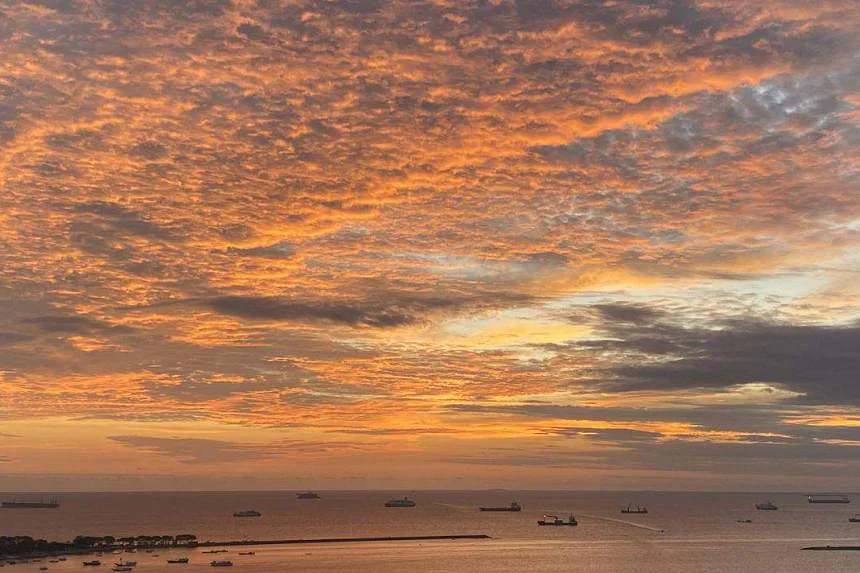
The 20th floor of Swiss-Belhotel Makassar offers the best sunsets. PHOTOS: LI-ANN TAN AND JON SONG
If the pandemic has indeed birthed a new generation of employees, digital nomads and gig workers, I am certain they will appreciate this new way of travel, one that demands mindful presence and a genuine curiosity of the cultures they come in contact with.
More importantly, most of these experiences, if not all, could not have been purchased with any number of package tours that parachute in time-starved tourists.
Sometimes, there is so much more you learn by going slow.
Slow travel tips
1. Make a list of experiences, but do not always stick to it
We did our research and found out what was fascinating about Sulawesi, but our list did not define our daily plan. We had, at most, a loose plan of where our next stop would be, but were very flexible.
Doing that opened up so many possibilities.
2. Travel local, speak local, eat local
Even if you can afford a private-hire driver or a flight, choose to take the local bus, train or boat.
That – and all the small eateries you can have a meal at – is where you will meet locals eager to share unvarnished tips on where to go. And you would be supporting small local businesses while at it.
3. Stay curious and do not be afraid to ask questions
The benefit of slow travel is the depth of experiences it brings. On your journey, do not be shy about asking questions and you will be surprised where your curiosity leads you.
- Formerly from the media and communications fields, Li-Ann Tan and Jon Song are nomadic storytellers who now spend more time abroad than back home. They document their slow travels on their YouTube channel Another Life (bit.ly/anotherlife_youtube).
- Bucket List is a new series on epic journeys.

